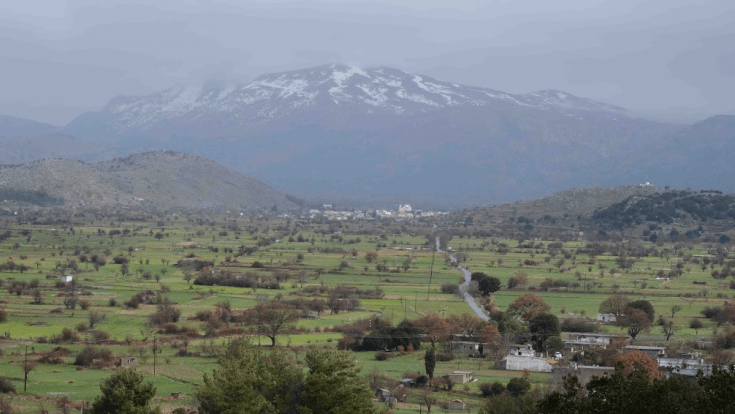Rural SMEs in the COVID-19 context: Key learnings

On Friday 21 January 2022, the Policy Learning Platform succesfully hosted an online discussion about raising the competitiveness of rural SMEs during COVID-19 times.
The online discussion was moderated by our Thematic Experts
- , business advisor and project manager at Swedish ESF-council in Central Norrland, SARURE projectDocument
- , project manager at Chamber of Commerce Regional Chamber of Commerce Moravia – Silesia, SKILLS+ projectDocument
- from Savonlinna Development Services Ltd, Rural Growth projectDocument
- from Kerttu Saalasti Institute, University of Oulu, FOUNDATION projectDocument
Insights from the presentations
The online discussion served as an opportunity to come together and share good practices in reacting to the COVID-19 crisis. The discussion aimed to exchange ideas across projects on how to go forward and develop policy in the new situation.
The discussion featured two good practice presentations. Bitti Alvin Lehmann, project partner in the SARURE project, talked about the Financial program for Rural Development of SME´s implemented in Central Norrland, Sweden. It is a financial support system for small rural grocery stores in the countryside providing home delivery food service to the local households which became essential during the pandemic when “the companies had to go to the customers because customers could not reach them”. For some businesses, this measure and change in business activity brought about a new customer base and increase in employees.
Jan Skipala introduced the Rychla Rada (Quick Advice) good practice uploaded by the SKILLS+ project from the Moravian Silesian region (Czech Republic). As elsewhere in Europe, various national, regional and city level support schemes to SMEs were set up in the Czech Republic. Still, as the pandemic continued and new instruments were introduced, it soon became difficult for SMEs to orientate between national and European programmes. It was difficult for SMEs to determine which programme was most reasonable for their needs and how to match different support schemes. The Quick Advice platform was free of charge consulting support provided by seven regional business support organisations that, in an agile way, helped SMEs orientate between the programmes and submit the relevant applications.
During the subsequent discussion, other projects shared their experience. Pellervo Kokkonen from Savonlinna Development Services Ltd (Finland) represented the Rural Growth project and gave an overview of the challenges and opportunities identified within their project consortium concerning supporting rural SMEs during and post-COVID. For example, most partners had identified severe post-Covid labour shortages, which caused further businesses to close. The labour shortage challenge was echoed by other participants in the online discussion, illustrating that this truly is a common challenge that European regions are facing. Pellervo also talked about Savonlinna Live, which reformed the way plans for tourism seasons are made – much more flexible, daily and weekly tourist destination programmes are now implemented in Savonlinna, which are more durable to the effects of the pandemic.
Ossi Kotavaara, from University of Oulu (Finland), a project partner in the FOUNDATION project, raised the topic of early-stage exports of rural businesses and highlighted the good practice Rural SME internationalisation model, which provides a peer network and shared marketing support. He also brought up the topic of “multi-local and location free work” which led to a more detailed joint discussion about this trend. Various regions attending the online discussion had experienced people returning to the countryside as distance working became mainstream in businesses. It was especially eye-opening that the most common search word has been “homework” on one jobs portal in Western Norway.
Key learnings
In times of unexpected crisis, such as COVID-19, which halts standard procedures within an organisations business support activity, it makes sense to be flexible and re-position the role of staff members. For example, an expert on internationalisation activities could be an important asset for local crisis response measures in a call centre.
For rural areas, the relocation of talented people during the COVID pandemic has created a new opportunity to attract taxpayers to their regions or workers to their enterprises. Suppose urban businesses are eager to get their employees back to the office as soon as possible. In that case, rural SMEs could seize the opportunity and allow the frequent home office to attract talent who value flexibility in their work life. Rural businesses could make their flexibility an asset in the labour market. Cheaper property in rural areas is another decisive pull factor.
It is likely that rural areas that also manage to set up supportive infrastructure to distance workers – either in sophisticated co-working spaces/hubs or just rural shops and community centres with WiFi access and a cosy coffee corner – will come out as the winners in the post-pandemic world. Old public buildings such as schools and libraries could solve the problem of lacking office space in rural areas.
The increased digitalisation of processes and increased digital skills within business support organisations, public authorities, clusters, and rural businesses has also made it easier for remote innovation networks to collaborate with more centrally located institutions.
While it was a rich discussion, not all topics (digitalisation of agri-businesses, one-stop shops for business support, funding mechanisms for rural SMEs, export potential of rural SMEs) were covered in detail. Some of these topics have been previously addressed by the platform (see list of resources below). However, the Interreg Europe Thematic Experts are always there to further work on these topics through our expert services, namely matchmakings and peer reviews.
Policy Learning Platform Resources:
- E-Workshop on competitive and sustainable tourism sector
- E-Workshop on SMEs digital transition
- Policy Brief - Regional branding for SME success
- Policy Brief - How to boost entrepreneurship in rural areas?
- Policy Brief -
- Workshop - Mastering the digital transformation of business support